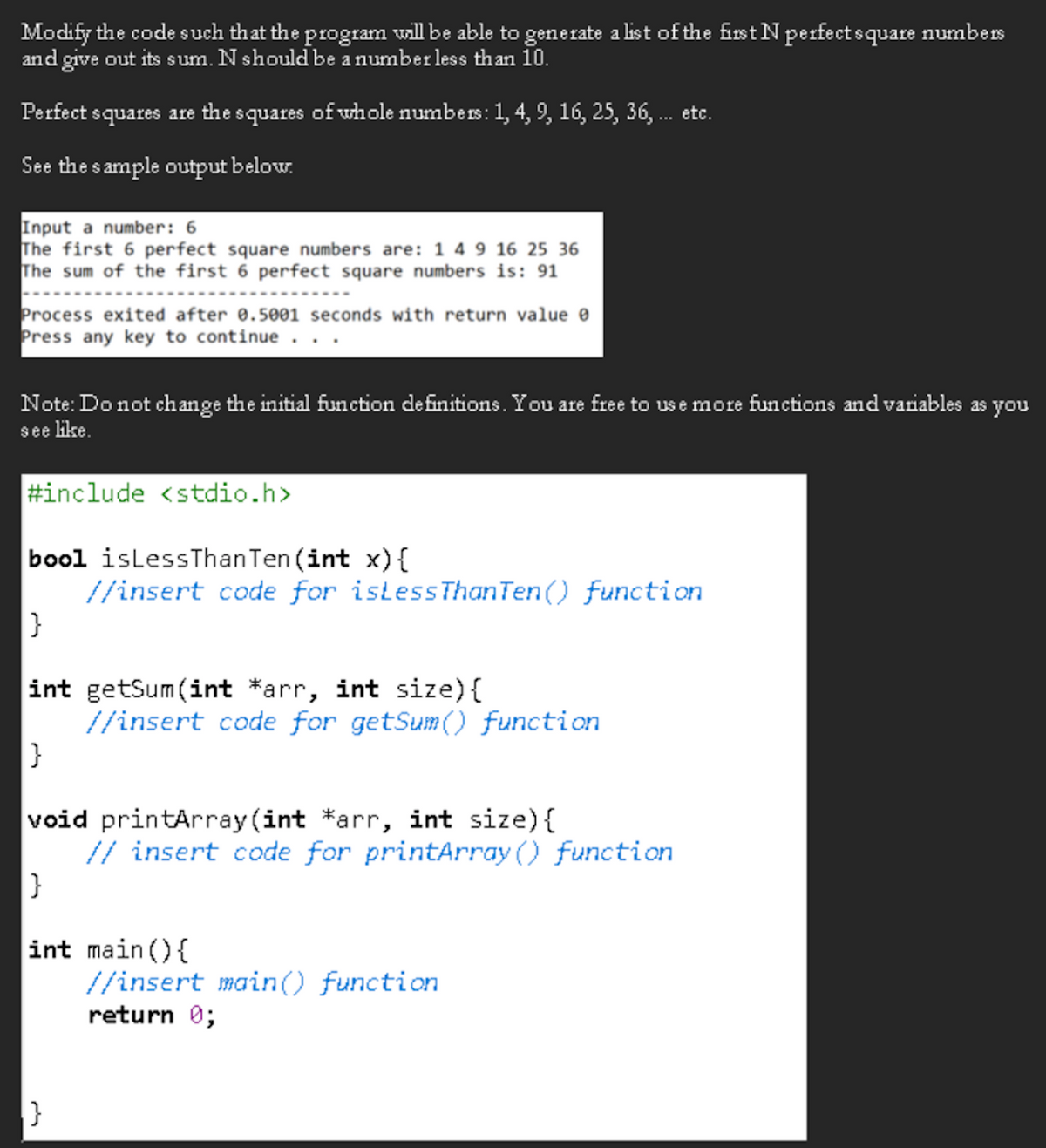Modify the code such that the program will be able to generate a list of the first N perfect square numbers and give out its sum. N should be a number less than 10. Perfect squares are the squares of whole numbers: 1, 4, 9, 16, 25, 36, . etc. See the s ample output below. Input a number: 6 The first 6 perfect square numbers are: 1 4 9 16 25 36 The sum of the first 6 perfect square numbers is: 91 Process exited after 0.5001 seconds with return value e Press any key to continue . Note: Do not change the initial function de finitions. You are free to use more functions and variables as you see like. #include bool islessThanTen (int x){ //insert code for islessThanTen() function } int getSum(int *arr, int size){ //insert code for getSum() function void printArray (int *arr, int size){ // insert code for printArray () function int main (){ //insert main() function return 0;
Modify the code such that the program will be able to generate a list of the first N perfect square numbers and give out its sum. N should be a number less than 10. Perfect squares are the squares of whole numbers: 1, 4, 9, 16, 25, 36, . etc. See the s ample output below. Input a number: 6 The first 6 perfect square numbers are: 1 4 9 16 25 36 The sum of the first 6 perfect square numbers is: 91 Process exited after 0.5001 seconds with return value e Press any key to continue . Note: Do not change the initial function de finitions. You are free to use more functions and variables as you see like. #include bool islessThanTen (int x){ //insert code for islessThanTen() function } int getSum(int *arr, int size){ //insert code for getSum() function void printArray (int *arr, int size){ // insert code for printArray () function int main (){ //insert main() function return 0;
C++ Programming: From Problem Analysis to Program Design
8th Edition
ISBN:9781337102087
Author:D. S. Malik
Publisher:D. S. Malik
Chapter5: Control Structures Ii (repetition)
Section: Chapter Questions
Problem 29PE
Related questions
Question
Do not take from chegg or any other!!
FLOWCHART AND CODE
Make a c-language code of the problem and include its FLOWCHART, not using a pseudocode should be based on codes.

Transcribed Image Text:Modify the code such that the program will be able to generate a list of the first N perfect square numbers
and give out its sum. Nshould be a number less than 10.
Perfect squares are the squares of whole numbers: 1, 4, 9, 16, 25, 36, . etc.
See the s ample output below.
Input a number: 6
The first 6 perfect square numbers are: 1 4 9 16 25 36
The sum of the first 6 perfect square numbers is: 91
Process exited after 0.5001 seconds with return value e
Press any key to continue . . .
Note: Do not change the initial function defnitions. You are free to use more functions and variables as you
see like.
#include <stdio.h>
bool islessThanTen (int x){
//insert code for istessThanTen() function
}
int getSum (int *arr, int size){
//insert code for getSum() function
}
void printArray (int *arr, int size){
// insert code for printArray () function
}
int main (){
//insert main() function
return 0;
Expert Solution
This question has been solved!
Explore an expertly crafted, step-by-step solution for a thorough understanding of key concepts.
This is a popular solution!
Trending now
This is a popular solution!
Step by step
Solved in 4 steps with 4 images

Knowledge Booster
Learn more about
Need a deep-dive on the concept behind this application? Look no further. Learn more about this topic, computer-science and related others by exploring similar questions and additional content below.Recommended textbooks for you

C++ Programming: From Problem Analysis to Program…
Computer Science
ISBN:
9781337102087
Author:
D. S. Malik
Publisher:
Cengage Learning

C++ Programming: From Problem Analysis to Program…
Computer Science
ISBN:
9781337102087
Author:
D. S. Malik
Publisher:
Cengage Learning